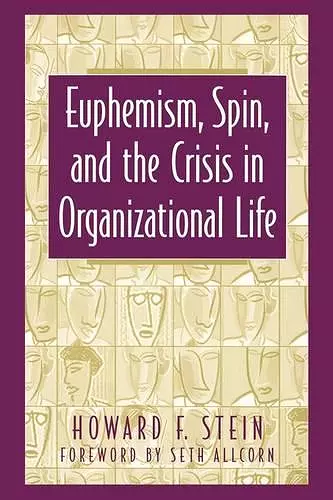Euphemism, Spin, and the Crisis in Organizational Life
Format:Hardback
Publisher:Bloomsbury Publishing PLC
Published:30th Jul '98
Currently unavailable, and unfortunately no date known when it will be back

"[This] is a profoundly disturbing book, but one that is essential reading for anyone who wishes to begin the hard work of creating healthy organizations in which people can labor productively and generate meaning and value for their own lives and those of others... Stein sees in euphemism and spin the face of organizational evil. This fine book provides an illuminating analysis of the psychodynamics of euphemism, opening up whole new areas of inquiry into the rampant psychological violence we do to each other in the workplace, which is the crisis that Stein correctly identifies for us. For readers who want a deeper level of understanding of organizations and who seek answers beyond tomorrow and the next quarter's profits, this book has wisdom." -- Guy B. Adams^LProfessor of Public Administration^LUniversity of Missouri-Columbia "Once again Howard Stein has forced us to honestly confront the consequences of downsizing in the health care industry. He has taken us beyond the denial through euphemism of what is really happening and what down-sizing means in human terms. For Howard Stein it is not the budgetary bottom line that matters most, but instead the human costs that must be given primary consideration in the down-sizing so often associated with managed care." -- Deward E. Walker, Jr., Ph.D^LProfessor of Anthropology and Ethnic Studies^LUniversity of Colorado "[This is] an important contribution not only to the study of organizational life, but to understanding hidden dimensions of our institutions and culture more generally. In reading the book, I came to see how the search for euphemism so common in organizational communication represents a flight from reality that can have the most damaging consequences for the health of organizations and of those who work in them. It is a vivid work, and one I highly recommend for all those who experience the frustrating and confusing mode of communication typical in organizations. Confusion is so much a part of our work experience, yet so little is written that dispels rather than adding to it. Professor Stein's work is the exception to this rule. He sheds light where others leave us in the dark." -- David P. Levine^LGraduate School of International Studies^LUniversity of Denver "Dr. Stein has not only captured and defined the truths within the corporate world but within our worldwide culture(s). I find his book honest, disturbing, saddening and also quite inspiring... I find the content and truth too valuable not to incorporate [in my syllabus]." -- Harry L. Moore, Ph.D^LAdjunct Professor of Philosophy and Ethics^LSt. Gregory's University^LUniversity of Central Oklahoma^LUniversity of Oklahoma
In this book about deception and self-deception in and beyond the workplace, Stein portrays a psychological, ethical, cultural, and spiritual crisis that cannot be reduced to a business crisis.
In this book about deception and self-deception in and beyond the workplace, Stein portrays a psychological, ethical, cultural, and spiritual crisis that cannot be reduced to a business crisis. He shows how the language of economics shrouds loss, dread, rage, despair, and brutality in the guise of rational business necessity. For example, the act of ridding a workplace of thousands of people has become magically, euphemistically transformed into an impersonal, bottom line based exercise in downsizing and outsourcing. As Stein explores the role of euphemism in the official doctrines and public claims of business, he also portrays how people experience the trauma of repeated mass layoffs, and the constant turmoil over shifting workroles and uncertain job security. Stein shows how the inner experience of downsizing, reengineering, and corporate medicine becomes part of a person's very essence and structure, not some unfortunate epiphenomenon.
Three extensive case studies—one of downsizing (and related social engineering concepts), one of managed care, and another of the U.S. prairie's adaptation to life afterthe Oklahoma City bombing—provide the evidence for his interpretation. Stein supplements these with telling analyses of the concept of spin, the popularity of Scott Adams' Dilbert cartoons, George Orwell's trenchant use of euphemism in his novels, and the web of words on which the Nazis' extermination program was spun. He shows how our priorities have created long-term massive social casualty for the sake of short-term gain. Further, he shows how a widespread cultural ethos of scarcity and callousness transcends the boundaries of workplace and business. He calls for an ethical awakening from our self-deceptions and the social harm we have done in the name of good business, and for direct, honest language that expresses our feelings and intentions.
[T]rainers can use it to consider the ways we can positively contribute to our organizations....Just in time for you to prepare for the Millennium. - Training Trends
ISBN: 9781567201246
Dimensions: unknown
Weight: unknown
192 pages